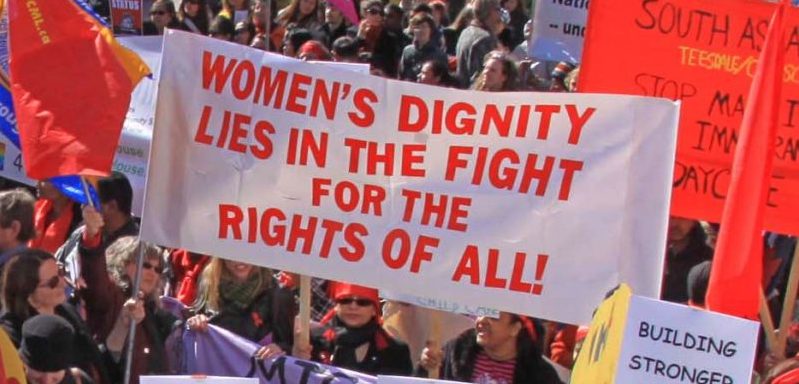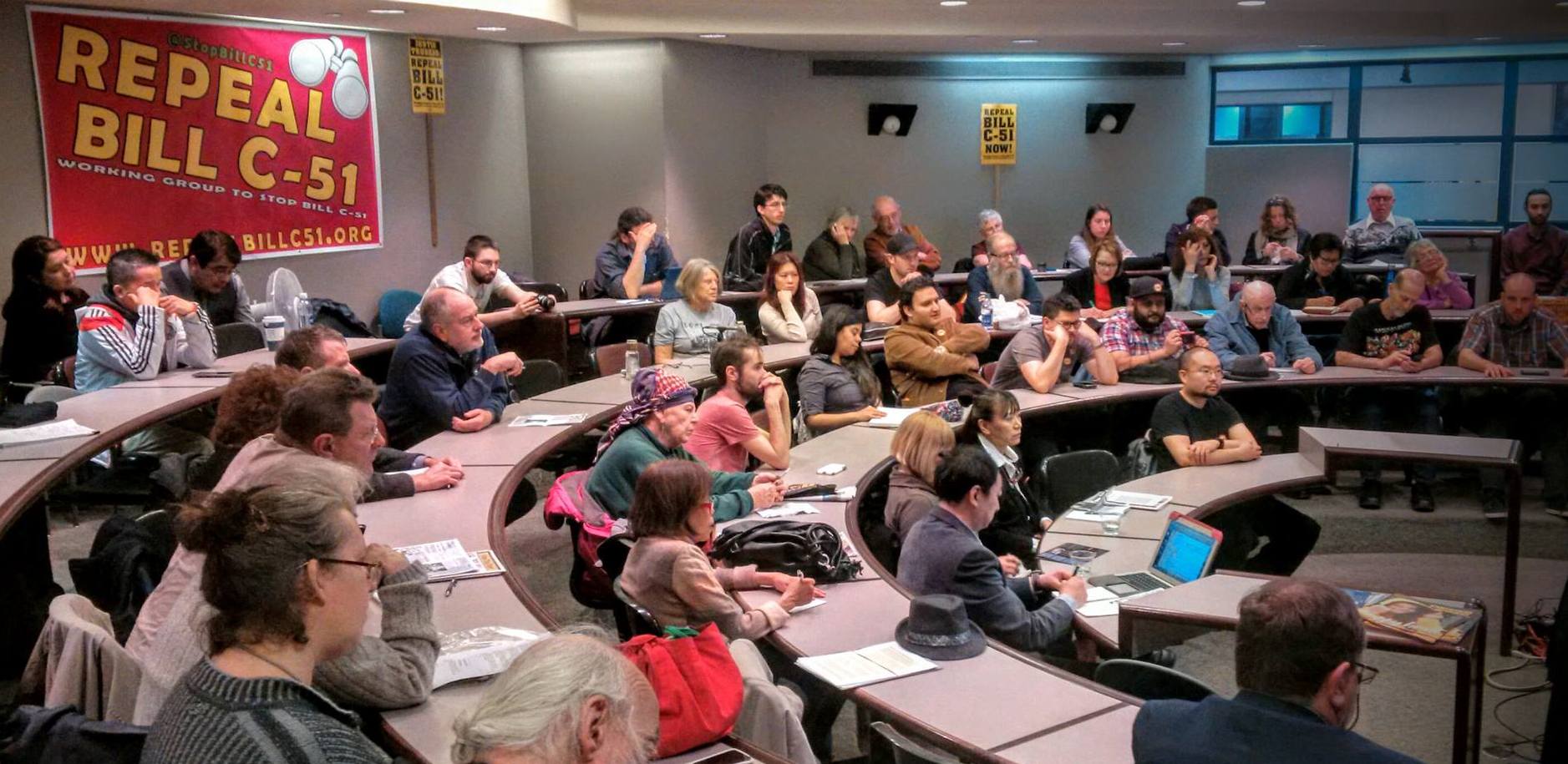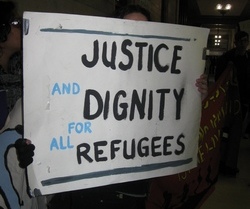
March 7, 2016 • No. 7 | PDF Previous Issues
All Out for March 8 — International Women’s Day
Women Workers Must Lead the Struggle
for Renewal

The Communist Party of Canada (Marxist-Leninist) greets March 8, International Women’s Day, with full confidence that women workers will continue to take the lead in the work to renew the political process and the society. Communist women have proven in this period, as in the past, that they take up the question of gender discrimination as a question of emancipating the working class. The mobilization of women workers for the renewal of the political process is a step in this direction.
All Out for International Women’s Day!CALENDAR OF EVENTS |
The present period is one of retreat of revolution in which the working class has not lost its leading role. Far from losing its leading role, it is the working class which has to provide an alternative to the retrogression which is being imposed on the society. Women workers have a crucial role to play, first and foremost, by ensuring that they do not get diverted or dissipate their energies on issues which do not put them at the centre-stage of the developments. They must, as is the case with all the workers, be political, work out their program, and take the same to all sections of the society.
This year on International Women’s Day we call on all women workers to pledge their adherence to the cause of their class. In the course of the developments since the onset of the anti-social offensive in 1989, no women with positions of power and privilege have advocated for women in a meaningful manner. On the contrary, while women suffer the most in the war zones, the plight of oppressed and exploited women is used to serve the war agenda of the ruling class. In the name of opposing discrimination, religious persecution, rights, womanhood and any other high ideal, successive Canadian governments pick and choose which women and causes to support. The imposition of American-style democracy in the countries of Asia, Africa, Latin America and the Caribbean has increased their enslavement. So too the working people in the former Soviet Union and eastern European countries are no better off as a result of this “democracy.” The so-called democracy movements are mere pretexts to increase the takeover of these countries and bring about regime change. Women workers must not merge with such movements and waste their energies.
Women workers must raise their own demands within the struggle for the emancipation of the entire working class. Only in this way can all women be emancipated. Advanced women workers should join the Party, organize basic organizations for the emancipation of women at the workplace, inclusive of all fellow workers, irrespective of gender, and excel in the taking up of political affairs under the banner of the democratic renewal of the political process.
CPC(M-L) takes this opportunity to express its full support for all women fighting for emancipation across this country and on the world scale and to hail the increasing participation of women in political affairs. The Party condemns the hypocrisy of the government of Canada that picks and chooses which women and causes to support but continues to cover up the treatment it reserves for women and in particular Canada’s Indigenous women. CPC(M-L) condemns all acts of oppression and humiliation of women, rape and other forms of brutality and terror which continue thanks to the conditions of capitalist exploitation and wage slavery and the vicious anti-social offensive that seeks to take away all vestiges of the right to redress for crimes committed against women. All those committing crimes against women must be punished.
Women Workers, Together Let Us Achieve a Society that Defends the Rights of All by Leading the Struggle for Renewal!
The Communist Party of Canada (Marxist-Leninist) is registered for electoral purposes as the Marxist-Leninist Party of Canada.
The Need to Repeal Bill C-51, Anti-Terrorism Act, 2015
Successful Conference Held in Vancouver

A successful “Repeal Bill C-51!” 2016 Conference was held in Vancouver on February 28. More than 70 people came together to discuss how best to move forward to build the movement to repeal the anti-people, anti-democratic law adopted by the Harper government with Liberal support. More than three months after the election of Justin Trudeau and the Liberals, the hated Bill C-51 continues to be law. Canada’s spy agency CSIS has already admitted to conducting black ops using its “disruption” powers, while the Liberals continue to make vague promises of possible amendments and consultations. The conference was an important opportunity to discuss how to move forward in this new context to defend the rights of all.
 The Conference was organized by the Working Group to Stop Bill C-51, which is nearing one year of consecutive weekly actions against Bill C-51. These actions have become well known across Canada, and have served as an important tool for continuing the public campaign to Repeal Bill C-51.
The Conference was organized by the Working Group to Stop Bill C-51, which is nearing one year of consecutive weekly actions against Bill C-51. These actions have become well known across Canada, and have served as an important tool for continuing the public campaign to Repeal Bill C-51.
The broad movement against Bill C-51 was well represented by the six speakers in the two conference panels: “What is the State of Bill C-51 Today?” and “Building the Movement to Repeal Bill C-51. Audrey Siegl also opened the conference with an official Musqueam Welcome.
Micheal Vonn of the BC Civil Liberties Association, Dr. Samir Gandesha, Director of SFU Institute for the Humanities and Charles Boylan, the Coordinator of the Working Group to Stop Bill C-51 formed the first panel. Together they gave a detailed analysis of the origins of Bill C-51, the international crackdown on dissent, and the challenges posed by the the new government of Canada which has promised, “Real Change Now” but definitely has not delivered this on Bill C-51.
The first workshop was chaired by Jean Ardila of the Human Rights & International Solidarity Committee of the Education & Training Employee Association and the second workshop by Bowinn Ma of Stop Bill C-51 and United We Stand.
 During the second panel, Chief Bob Chamberlin, Vice President of Union of BC Indian Chiefs, George Davison, President of the Federation of Post-Secondary Educators and Thomas Davies of the Working Group to Stop Bill C-51 discussed how best to move forward to organize to repeal Bill C-51. The common sentiment was that Bill C-51 is an attack on so many sectors of society, it provides an opportunity to strengthen our unity in action and coordination as the demand to Repeal Bill C-51 and defend the rights of all is in the interests of all sections of the people.
During the second panel, Chief Bob Chamberlin, Vice President of Union of BC Indian Chiefs, George Davison, President of the Federation of Post-Secondary Educators and Thomas Davies of the Working Group to Stop Bill C-51 discussed how best to move forward to organize to repeal Bill C-51. The common sentiment was that Bill C-51 is an attack on so many sectors of society, it provides an opportunity to strengthen our unity in action and coordination as the demand to Repeal Bill C-51 and defend the rights of all is in the interests of all sections of the people.
More than half the conference was devoted to discussion between all of the participants. There was never a lull in discussion, as people asked questions of the presenters, and also shared their own analysis and ideas on how to move forward.
The conference closed with an open invitation by the Working Group to Stop Bill C-51 to join its 51st picket action in 51 weeks against Bill C-51. The conference reaffirmed the necessity to continue to educate, organize and mobilize to demand that Justin Trudeau and the government of Canada, “REPEAL BILL C-51!” The government must constantly be reminded that not only do people across Canada want this law repealed, but they are also willing to organize against it.

(Working Group to Stop Bill C-51)
52nd Weekly Action, Vancouver, March 7
 Monday, March 7 — 4:00 pm
Monday, March 7 — 4:00 pm
Broadway and Commercial Dr.
No to All Forms of Terrorism!
No to Racism! No to Islamophobia!
Our Security Lies in Defending the Rights of All!
The Working Group to Stop Bill C-51 is marking one year of weekly actions with its 52nd weekly picket on March 7 across the Lower Mainland. Every Monday for the past year, the Working Group to Stop Bill C-51 has organized a public action against Bill C-51. These have included picket and petition drives, banner drops, rallies and most recently a successful conference.
Black Ops at Home and Abroad
Violations of the rights of Canadians and other peoples by Canadian intelligence and security bodies and black ops have been ongoing including revelations about the use of powers granted by Bill C-51. The Director of the Canadian Security Intelligence Service (CSIS) has confirmed that Canadian secret police have been using the new “disruption” powers granted under Bill C-51, the Anti-terrorism Act, 2015.
 CSIS director Michel Coulombe spoke to the House of Commons Public Safety and National Security Committee on February 23 to “provide an overview of [CSIS]” and “the key factors and trends affecting Canada’s national security, and what they mean to the service, and to Canada.”
CSIS director Michel Coulombe spoke to the House of Commons Public Safety and National Security Committee on February 23 to “provide an overview of [CSIS]” and “the key factors and trends affecting Canada’s national security, and what they mean to the service, and to Canada.”
The kind of “disruption” that is now permitted by CSIS is not limited by any laws except to say its agents are not permitted to cause bodily harm or death, obstruct, pervert or defeat the course of justice, or violate the sexual integrity of an individual. However the CSIS Act which defines the agency’s powers also permits agents to break any law if they receive a warrant as part of a secret judicial procedure.
“Disruption” powers may be used to “take measures, within or outside Canada” against any activity that there are “reasonable grounds to believe” “constitutes a threat to the security of Canada.” This is not limited to what is branded as terrorism or terrorist threats.
The CSIS director said that “[t]errorism, including the radicalization of Canadians remains the most prominent, serious and immediate threat to Canadians and Canadian interests both at home and abroad.” He stated that “[t]he number of successful terrorist prosecutions since 2002 is a testament to our level of engagement, and that of the RCMP as well, and the priority placed on countering this threat.”
Committee member Nathaniel Erskine-Smith, Liberal MP for Beaches-East York asked the CSIS director about the use of powers given under C-51.
Nathaniel Erskine-Smith: “Have the new disruption powers been used since C-51 was adopted?”
Michel Coulombe: “Yes, they have.”
NES: “With respect to information sharing, has information sharing increased since C-51’s adoption?”
MC: “I would have to go back and check. We have daily information sharing and I wouldn’t be able to say if it has actually increased since the Security of Canada Information Sharing Act [part of C-51] came into force.”
NES: “Assume, for the sake of argument, that C-51 had not been adopted. Other jurisdictions explicitly state the powers of intelligence agencies. So, if we were to do the same, what specific powers would CSIS require that were unavailable pre-C-51?”
MC: “Well, we’re talking, and the issue of, it’s certainly timely with the debate in the U.S., the issue of what is labelled as ‘going dark,’ or inability, despite the fact that we have federal court warrants, or inability to intercept, or obtain the information that we’ve been authorized to do by the court for all kinds of reasons, encryption, data sitting outside Canada, there’s a number of reasons why that would certainly be a top priority for the Service.”[1]
NES: “There was one concern with respect to seeking judicial authorization of Charter violations. Has that occurred since the adoption of C-51?”
MC: “No.”
Erskine-Smith did not ask about what “disruption” powers had been used against or what sort of disruptions were carried out, nor did other committee members ask about CSIS’ use of C-51 powers.
“Disruption” powers have also been exercised by the Communications Security Establishment (CSE), although this was not explicitly authorized in Bill C-51. Documents obtained by the Toronto Star show that CSE told the Minister of National Defence in November 2015 that it can aid with CSIS actions against “threats.”
According to University of Ottawa law professor Craig Forcese this could include, without a warrant, using CSE’s wide-ranging internet monitoring powers and integration with the U.S.-led Five Eyes network to determine the location of individuals overseas for CSIS. Forcese suggests that other activities could require a warrant.
Note
1. “Going dark” refers to the alleged danger to criminal investigation posed by electronic encryption, which has been hyped-up by government, law enforcement and intelligence agencies in the context of a dispute between Apple and the Federal Bureau of Investigation over access to password-protected mobile devices.
Illegal Collection and Sharing of Canadians’
Internet Metadata
The Communications Security Establishment Annual Report for 2014-2015 by commissioner Jean-Pierre Plouffe was tabled in the House of Commons on January 28. It said that CSE “discovered” that it had for years been sharing Canadians’ internet metadata with the intelligence agencies of other “Five Eyes” countries (U.S., U.K., Australia, New Zealand) in violation of the law. This is how the Minister of National Defence described what took place:
 “CSE discovered, on its own, that certain types of metadata were not being properly protected prior to sharing with allies, due to technical deficiencies in CSE systems. CSE proactively informed the Commissioner about these matters, and suspended the sharing of this metadata to Canada’s partners. […]
“CSE discovered, on its own, that certain types of metadata were not being properly protected prior to sharing with allies, due to technical deficiencies in CSE systems. CSE proactively informed the Commissioner about these matters, and suspended the sharing of this metadata to Canada’s partners. […]
“The metadata in question that was shared with Canada’s partners did not contain names or enough information on its own to identify individuals. Taken together with CSE’s suite of privacy protection measures, the privacy impact was low. […]
“Metadata is the information about communications used by computer systems to identify, manage or route communications over networks. It does not include the content of a communication. For example, it does not include the content of emails, phone calls or text messages. Metadata is used to understand complex and changing networks, discover and analyse foreign intelligence targets and their social networks and identify cyber threats. It helps us understand how foreign actors, such as terrorist groups, cyber actors or hostile intelligence agencies use networks and systems. […]
“CSE helps protect Canada and Canadians by collecting foreign signals intelligence based on Government of Canada intelligence priorities, helps protect electronic systems and networks against cyber-attacks and assists federal law enforcement and security agencies. CSE cyber defence analysts use metadata to discover cyber threats from foreign states, criminals and other threat actors who are trying to extract information from Canada’s systems, or are attempting to disrupt service on Canada’s critical electronic networks by using malicious software or malware.”
Plouffe later said the problem was “not accidental” but because of a “lack of due-diligence.”
This is all a sad joke because one major purpose of the “Five Eyes” network in which CSE is integrated is specifically to monitor the citizens of each others’ countries. Canada does not need to improperly collect and send the metadata of Canadians to spy agencies in other countries because any information on Canadians it wants can be garnered from its “partners” and all are at the fingertips of the CIA.
Secret documents leaked by Edward Snowden and published in January 2015 revealed that CSE monitors up to 15 million downloads each day as part of an initiative codenamed LEVITATION. It does so via another secret operation called ATOMIC BANJO what taps directly into internet cables and bypasses internet service providers. Canadians’ metadata is included in this collection.
Further documents released in March 2015 showed CSE performs a variety of “computer network exploitation” and “computer network attack” operations. This includes the use of a computer worm called Stuxnet reportedly developed by the U.S. and Israel to sabotage Iran’s peaceful nuclear program. The documents also suggest that CSE has access to malware tools developed by the U.S. National Security Agency. Beyond cyber-attacks CSE uses “deception techniques” including “false flag” operations to “create unrest” and using “effects” techniques to “alter adversary perception.” “Effects” operations can refer to anything from propaganda on social media to disrupting communications.
(With files from The Intercept)
In the Parliament
Look Out for Amendments to Anti-Worker Laws and Citizenship Act
The Parliament resumes work on Monday, March 7 after a week-long recess from February 29 to March 4 in which members returned to their ridings.
The main items on the agenda in the House of Commons are amendments to legislation governing the rights of public and private sector workers as well as amendments to the Citizenship Act.
 During the 2015 federal election campaign the Liberal Party pledged to repeal a number of changes to labour relations law enacted by the previous Conservative government. So too the Conservatives made a number of changes to citizenship law which the Liberals pledged to repeal.
During the 2015 federal election campaign the Liberal Party pledged to repeal a number of changes to labour relations law enacted by the previous Conservative government. So too the Conservatives made a number of changes to citizenship law which the Liberals pledged to repeal.
In this way the Liberals are fulfilling their election pledges for the repeal of these laws. At the same time, people should pay attention to whether these bills substantively change the lot of the people or simply return to the former status quo.
When the Conservatives passed the anti-workers laws now slated for repeal some pointed out that such laws were not demanded by the biggest employers in Canada, who already have the upper hand and serious privileges within labour relations law.
One of the laws which would be repealed by the new government Bill C-4 subjected labour unions to increasing state scrutiny over their political activity and expenditures, far beyond what is expected of other organizations. Another restricted the ability of workers to join a union via signing membership cards and made it easier for employers to exert pressure for workers to vote against joining a union. These changes were labeled by many as “unnecessary,” in the latter case not least because employers and the state already have tremendous power to prevent workers from forming a union and defending themselves effectively.
In a similar vein, government Bill C-5 would repeal measures that authorize the Treasury Board, the employer of federal public sector workers, to unilaterally change sick leave benefits during collective bargaining. The previous government claimed this was needed to “save money” and “control costs.” The Liberals pledged to abolish this and said they would respect public sector workers.
However federal public service unions now report that the Treasury Board is asking for the same power over sick leave benefits to be handed over voluntarily by the workers during resumed contract negotiations. This time, the Liberals have blamed “a tough fiscal situation from the previous government.” Unions say the Liberal government’s proposals so far have been “similar to that of the previous Conservative government.”[1]
The agenda for the week as of the time of publication is reproduced below. Parliament will take another recess from March 14 to 18, sit from March 21 to 24, and then recess again from March 25 to April 1.
Monday, March 7
The House of Commons will vote on government Bill C-4, An Act to amend the Canada Labour Code, the Parliamentary Employment and Staff Relations Act, the Public Service Labour Relations Act and the Income Tax Act. The bill is at second reading stage and will go to the committee stage if passed. The bill would effectively repeal anti-worker Conservative private members’ bills C-377 and C-525 adopted in 2015.
Second reading will continue on Bill C-2, An Act to amend the Income Tax Act, which would put into law the Liberals’ changes to income tax brackets already put into effect on December 9 with a ways and means motion.[2]
An NDP motion will also be voted on which calls on the government to strengthen the Employment Insurance system by creating a “universal threshold of 360 hours” to qualify, repealing Conservative reforms to EI and mandating that EI funds cannot be used for other purposes.
Tuesday, March 8
The House of Commons will vote on a motion introduced by Prime Minister Trudeau supporting the government’s redefinition of its role in the U.S.-led war in Iraq.[3] Debate will begin on an amendment proposed by interim Conservative leader Rona Ambrose to reverse the decision to remove Canadian CF-18 planes from the mission.
Wednesday, March 9
Bill C-6, An Act to amend the Citizenship Act will have second reading in the House of Commons. The bill was introduced by Minister of Immigration, Refugees and Citizenship John McCallum on February 25 and repeals some of the previous government’s changes to Canada’s citizenship law including allowing for the revocation of citizenship for dual citizens and potential dual citizens convicted of terrorism or high treason.
Thursday, March 10
The House of Commons will begin debate on Bill C-5, An Act to repeal Division 20 of Part 3 of the Economic Action Plan 2015 Act, No. 1, introduced by Treasury Board President Scott Brison. The bill seeks to repeal measures put in place by the previous government that gave the Treasury Board authority to make unilateral changes to public service workers’ sick leave benefits during collective bargaining.
In the Senate
The Senate resumes work on Tuesday, March 8. It will continue debate on the Speech from the Throne delivered December 8, 2015. Seventeen Senate bills are at second reading stage.[4] Conservative Senators are still in the majority and the Liberal government says it is creating a new, “merit-based” process to fill the 24 Senate vacancies.
Notes
1. See “Treasury Board’s Sleight of Hand to Achieve Anti-Social Aims,” Renewal Update, February 15, 2016 – No. 4.
2. See “House of Commons Adopts Neo-Liberal Changes to Income Tax Regime,” TML Weekly, December 12, 2015 – No. 39.
3. See “Canada’s New War Government,” Renewal Update, February 15, 2016 – No. 4.
4. For information about some current Senate bills, see “Legislation Before the Parliament,” TML Weekly, December 12, 2015 – No. 39.
TML Weekly
Read About the Program to Resettle Syrian Refugees
in Canada
As of February 28 more than 25,000 Syrian refugees have come to Canada. A little over half came as government-assisted refugees with the rest having private or semi-private sponsorship. The latest issue of TML Weekly, March 5, 2016 – No. 10 features a call from the Communist Party of Canada (Marxist-Leninist) for the working people to be vigilant and make sure their rights are defended in the context of defending the rights of all.
 TML Weekly explains the different “categories” these human beings are divided into and what are the implications for their wellbeing and future in Canada. CPC(M-L) raises the important questions, “What authority is to advocate for them as human beings with their particular needs? What authority is overseeing these needs as they go from one stage of settlement to the next? The entire matter seems to have become a pragmatic affair of disposing of them as quickly as possible. Phrases are bandied about: ‘they are lucky to be here,’ ‘they should be grateful,’ ‘everyone is doing their best,’ ‘they have been screened and Canadians have nothing to be afraid of.’ And that is that.'”
TML Weekly explains the different “categories” these human beings are divided into and what are the implications for their wellbeing and future in Canada. CPC(M-L) raises the important questions, “What authority is to advocate for them as human beings with their particular needs? What authority is overseeing these needs as they go from one stage of settlement to the next? The entire matter seems to have become a pragmatic affair of disposing of them as quickly as possible. Phrases are bandied about: ‘they are lucky to be here,’ ‘they should be grateful,’ ‘everyone is doing their best,’ ‘they have been screened and Canadians have nothing to be afraid of.’ And that is that.'”
“What is clear is that while the government gives the impression that it is defending the rights of Syrians in Canada and abroad this is not in fact the case. By having refugees sponsored privately or semi-privately, the onus to uphold various standards is put on various individuals, families and non-government organizations while how they are to be cared for is handed over to private interests and police forces. The unfolding events show that now is the time for the working class and its organizations to take concrete measures to make sure the rights of refugees are upheld in the context of defending the rights of all. This is the conclusion the Communist Party of Canada (Marxist-Leninist) thinks is warranted from its assessment of how the new arrivals have been placed in various communities, how their disposal is treated by the ruling circles and the pressure they are under. It is all the more important given that private monopolies and organizations connected with the Syrian opposition are working to make sure that the arrival of Syrians takes place in a way that benefits their vested interests.”
All of this shows the urgent need to step up the fight for a public authority which takes up its social responsibility to defend the rights of all and implement all the measures required by those who are the most vulnerable at any given time, CPC(M-L) says.
To read the full article in the latest TML Weekly, click here.
The latest TML Weekly also reports on a number of important national and international developments and the 70th anniversary of Winston Churchill’s “Iron Curtain” speech, considered the beginning of the Cold War. To read the full issue, click here.

